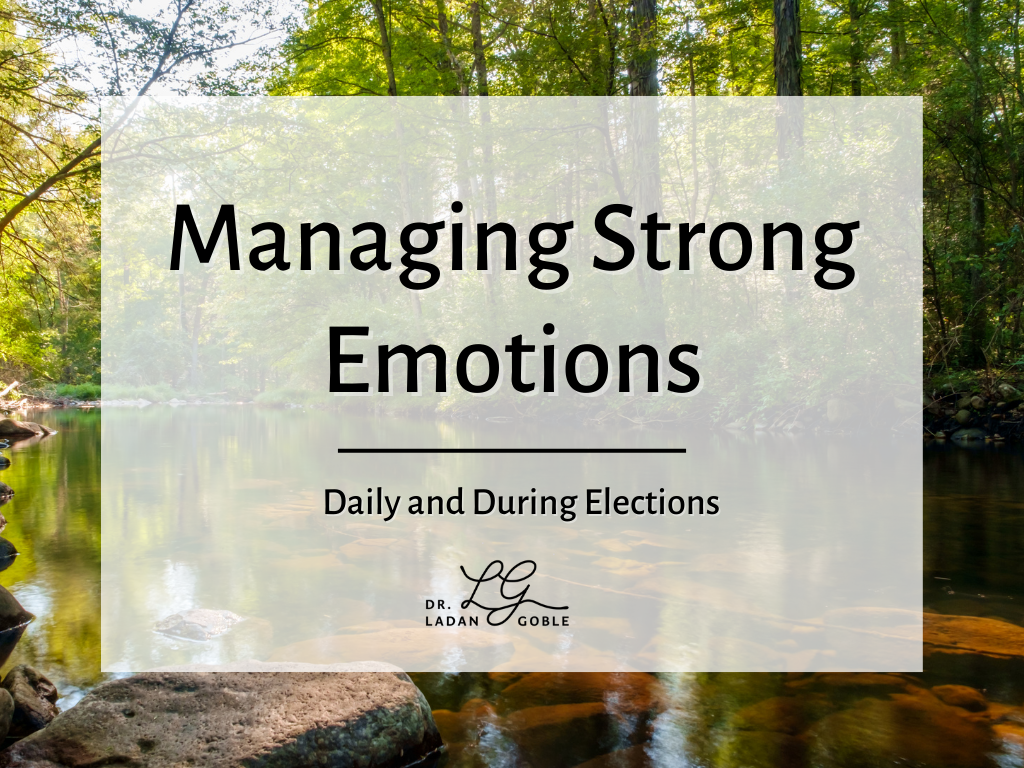Managing Strong Emotions
Whether you’re on the extreme left, extreme right, or somewhere in the middle, you or someone you know has been emotionally impacted by the election’s outcome and is managing strong emotions. You may feel at a loss on how to handle these interactions. Family members, friends, and once amicable neighbors become divided, and relationships suffer or end. Whether you are elated, devastated, or indifferent, here are some things to understand about emotions and behaviors that may help you better handle these situations.
Is Fear Directing Your Emotions?
During our upbringing, when an experience is emotionally charged, positive or negative, it influences how we think. Whether we are aware or not, our fears develop from previous experiences. Our unique experiences become meaningful and result in our viewing life differently. Over time, the process creates our belief system, which later shapes our values.
When we feel threatened, our attitude and actions follow; we may become zealous, outspoken, or even violent. We do this for self-preservation, drawing conclusions from previous experiences to keep ourselves safe, secure, and alive…they are protective and meaningful to us. When we are passionate about something and convinced it is true, we feel compelled to convince others. These are our personal convictions which we develop to protect ourselves and those we love. When others don’t agree, we feel invalidated, challenged, at times, threatened. When others try to convince us we are wrong, mock or humiliate us, we get offended, so we become defensive, animated, and reactionary.
Emotions Trigger Behavior
We react with strong emotions because we are afraid to get hurt and want to avoid pain. This is human nature. We all have a natural desire to be accepted and loved and a basic need to feel safe and secure. But when our personal beliefs don’t line up with those of others (family, friends, neighbors, co-workers), we fear our needs will go unmet or we will lose those relationships.
Understanding Human Nature and Fears
Most of us can agree that it’s easy to focus on ourselves. When we understand that most of us have fears and selfish desires, it’s easier to relate to one another. We all fear loss or having our needs unmet.
Called to Love
Despite our fears, we are called to love one another. We don’t have to agree with opinions or approve of behaviors to show love. 1 Corinthians 13:4-8 says, “Love is patient and kind; love does not envy or boast; it is not arrogant or rude. It does not insist on its own way; it is not irritable or resentful; it does not rejoice at wrongdoing but rejoices with the truth and love by showing patience, kindness, love, never boasting, bragging, holding resentment or bitterness.”
Becoming Spiritually Mature
Our words, thoughts, and actions can demonstrate God’s goodness in our lives and relationships. Galatians 5:22-23 says, “But the fruit of the Spirit is love, joy, peace, patience, kindness, goodness, faithfulness, gentleness, self-control.”
We can reflect God’s love when we act with humility, put aside offense, and recognize others as worthy of love and grace. These are steps toward maturity. Philippians 2:3-5 says, “Don’t allow self-promotion to hide in your hearts, but in authentic humility put others first and view others as more important than yourselves. Abandon every display of selfishness. Possess a greater concern for what matters to others instead of your own interests.”
We all desire to be heard, but to listen allows us to form relationships. Learning the skill of listening and understanding is a sign of maturity and an act of love. James 1:19-20 says, “Everyone should be quick to listen, slow to speak and slow to become angry, because human anger does not produce righteousness.”
Be Wise and Do Not Argue
When we argue, no one is listening, and it becomes more about personal gain. We must avoid engaging in arguments because nothing productive occurs. Instead, exercise communication with others who are curious, willing to introspect and learn from others.
2 Timothy 2:23-26 says, “Stay away from foolish and stupid arguments, because you know they grow into quarrels. And a servant of the Lord must not quarrel but must be kind to everyone, a good teacher, and patient. The Lord’s servant must gently teach those who disagree.”
Practical Steps to Finding Peace After Election Results
- Have a sense of curiosity and teachability. Whether it is your spouse, child, friend, family member or co-worker, be curious and teachable. Get to know them and their story before making any assumptions.
- Learn who they are by understanding their pain and how it started. It will help to better understand their viewpoint, i.e., why they may become fearful, angry, or frustrated.
- Learn how to support and validate them. Remain empathic and understanding about the pain they experienced and find a way to relate. We all have suffered and relate to pain.
- If becoming upset, learn how to disengage politely and respectfully. In any conversation or interaction that becomes frustrating, use assertive “I” statements instead of “you” statements, which may be perceived as attacks or accusatory.
- Provide respectful, reassuring statements to exit the conversation or situation. For example, “I will try to discuss this again later when I am calmer and better able to listen or think clearly.”
- Lastly, do not engage with others who are argumentative. In these interactions, no one is listening, and it becomes a one-sided dialogue. A person who is genuinely interested, curious and teachable will ask questions and aim to understand opposing views without becoming angry or defensive.
Whether emotional intensity is stirring up at home, work, school, among friends or neighbors, whether it is about the election outcome or something else, the principle and the solutions to disagreements remain the same.
Growing In Maturity
Every person wants to be seen, heard, understood and loved. Each person wants to matter, and the truth is, they do. No one person is more or less important than another.
Having strong convictions about something while others disagree is challenging. However, intense emotions or the behaviors that follow will not solve problems or result in good outcomes.
Desiring to improve in areas we are weaker or challenged, such as self-control, self-discipline, emotional self-regulation, humility, and a willingness to be wrong, demonstrates emotional maturity and produces better outcomes and relationships.
With emotional maturity comes acceptance that pain, suffering, and loss are inevitable and a normal part of life. Over time, we learn that certain pain produces goodness. Enduring pain and overcoming challenges leads to resilience. With the proper attitude and perseverance, we develop personal growth, strength, tolerance, character, and hope.
Personal Growth
As a psychiatrist who regularly hears the privately held hurts and pains of individuals, I’ve learned the art and skill of remaining objective and empathic.
When I listen to personal stories, I begin to understand the factors that influence a person’s beliefs and values. I’ve gained wisdom and insight from those with whom I disagree. I have developed an ability to listen more and speak less without denying my own personal convictions or moral values.
As a wife, mother, friend, and sister, I have learned areas where I was wrong, blind to my own shortcomings, rigid in my thinking, and afraid of losing my basic needs. In the process, I have learned that others fear the same thing. As a result, I have become more loving and accepting.
Learning how to handle emotions when disagreements occur leads to a better understanding of one another and improved relationships.
Remaining true to our personal convictions while remaining curious and open to learning about others leads to growth and maturity.
I have applied these principles in my own life and have changed for the better. I help my patients do the same.

Dr. Ladan Goble is a board-certified psychiatrist with over 25 years of experience in mental health. She is passionate about helping individuals lead fulfilling lives and provides compassionate care and evidence-based treatment.
Dr. Goble is accepting new patients in her Scottsdale, Arizona office. To schedule an appointment, please call 480.661.3877.
Follow Psychiatry of Scottsdale on social media to stay up to date on mental health strategies, patient testimonials, and office news. Find us on Facebook, Instagram and LinkedIn.
Disclaimer
The information provided on this blog is for educational purposes only and is not a substitute for professional medical advice. Always consult a qualified healthcare provider for personal advice and treatment.

